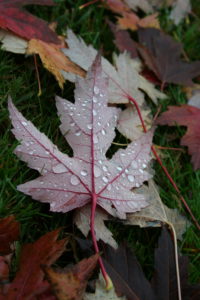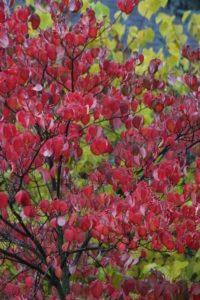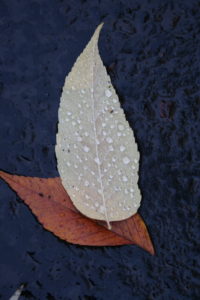Within two hours on a Friday morning, the sky went from blue, with a slight haze on the horizon and sunshine, to brown and stinky, with the visibility of about one or two city blocks. Stepping outside was like squeezing into a narrow chimney with a malfunctioning flue.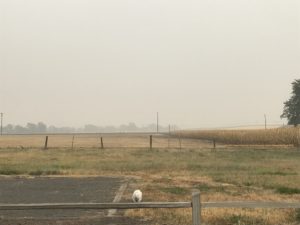
The year 2020
It was the gift that kept on giving. One of the worst, if not the worst year, in history for wildfires. January began with historic wildfires and high temperatures in Australia. Then, after a hot, dry August in the western United States, a series of lightning strikes ignited fires across California. In September, a windstorm and downed power lines, sparked fires across Oregon. Combine extremely dry conditions, fire crews stretched thin, and a shift to an on-shore flow from the Pacific, and suddenly my small inland valley was shrouded in a thick layer of smoke.
While we weren’t flying to international destinations or even venturing far from home these days, we’d had the summer joy of feeling a sense of freedom in the outdoors. We could enjoy our gardens, hiking, beaches, or even a restaurant meal outside on patio seating.
The Prison of Smoke
But then the dense hazardous smoke stopped all outdoor activity. Thanks to allergies, I limited opening the backdoor and wore an N95 mask to walk from the car to the office. The hum of the HEPA air filter was now a constant companion.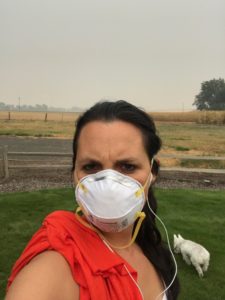
To those of us who crave freedom and are prone to restlessness, this was a new prison within a prison. Even the dogs would stick their noses through the door and quickly retreat back inside.
At first, I tried to make a game out of limited visibility from the window and the hourly check of the AQI (which peaked at nearly 600). While I resented being cheated of enjoying the usual lovely September weather, I tried to embrace the change of routine for one weekend.
With a large air filter next to my bed, I camped out on the bed with the dogs, books, and my laptop. I pretended the air cleaner sound was the wind of severe weather high in the mountains and that I was mountaineer hunkered down in my tent to ride out the storm. I would dash out as quickly as possible for a bathroom break or some food and dive back into my bed “tent.”
This was fun for about 24 hours before boredom and stiffness set in. Soon enough Monday arrived, and it was time to face the reality of a new workweek without any substantial improvement in the air quality or view.
For those with severe respiratory allergies, the unpleasant symptoms of prolonged hazardous air quality manifest as painful lungs, raw nasal passages, headache, achy joints, and fuzzy mental acuity. The general physical malaise is accompanied with overhanging melancholy, negativity, and complete lack of motivation–joined by its companion of guilt over low productivity and energy.
By Wednesday, I was complaining that I couldn’t find anything at all positive to talk about. One of my coaching colleagues challenged me to rise to the occasion and find the texture in the smoky conditions.
I was trying and simply found nothing intriguing or positive in the conditions around me. I turned to my usual sources of joy, but the birds were absent from my feeders and my garden had ceased to bloom in the lack of sun. The weird, brown light even cast an air of gloom around my carefully curated home. My internal achiever was quite frustrated with myself. I was negative and accomplished very little.
On Thursday I had given up and was fully immersed in my depression and negativity. My body and head ached. I dragged through the work day and then flopped onto the couch for the entire evening.
Friday was Day 8 of the smoke and I was sure that the horror was going to continue for weeks. I even argued with my friend over Friday night dinner that the 30 to 50% chance of overnight rain was going to do nothing to improve our air quality.
Saturday morning, I lazed in bed. No hurry to get up and face another day of smoky doom. Finally, I peeked out the window and saw my entire street was wet. Well, that’s promising, I thought. I wandered to the kitchen and peered into the back garden. Indeed, it was very wet. A light breeze ruffled through the trees, and bits of blue sky and sunrays were escaping around the remaining clouds. I threw open the door in amazement. A deep breath of wonderful post-rainstorm air confirmed the smoke had moved out. The dogs sat outside the door joyfully twitching their noses in the freshness.
Escaped!
This was not to be wasted. I put on my walking shoes and grabbed the leashes, and we launched out to enjoy the glorious morning.
The first thing I noticed was the tiny sparkling beads of water on the blades of grass. I reveled in the sight. Those droplets were so pure and clear against their green background. The round orbs reflected delight and renewal. I breathed in the energy. I found texture again, and I felt so grateful.
As the dogs and I rounded the corner back toward home at the end of our leisurely stroll, I saw that the dogwood leaves had changed to a fiery orange seemingly overnight. Had I neglected to notice them in the smoky depression, or had they indeed turned overnight with the chilly rainstorm?
As I pondered this question, I watched the breeze twirl the first leaves of autumn down to the ground. The change of seasons had arrived. I realized that some days I just don’t find texture or joy or gratitude easily—sometimes, not at all. And that’s ok.
It was just a mini-season, and seasons change.
I realized in the dark moments and days of melancholy, I need to be gentle on myself. I can simply allow myself to rest next to the air filter and be in the flow of my melancholy. Not every day needs to be about achievement and action. I can be gentle with myself, confident that the sun will shine again, the rain will fall again, and leaves will change colors. And when a mini-season changes, the world will once again be alive with texture.
